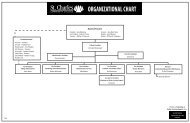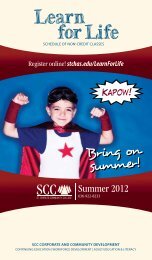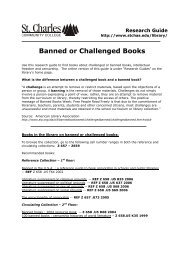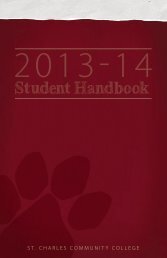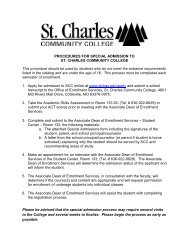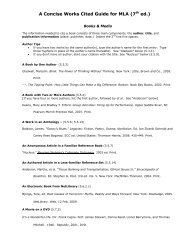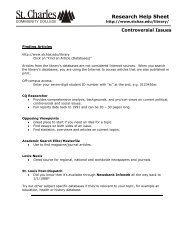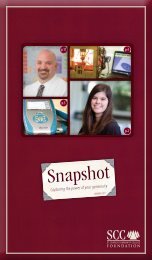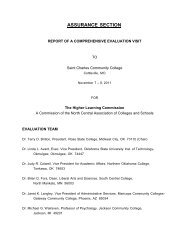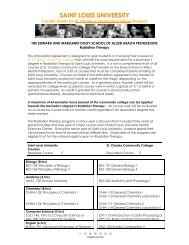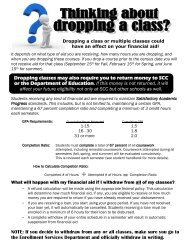2002-2004 Catalog - St. Charles Community College
2002-2004 Catalog - St. Charles Community College
2002-2004 Catalog - St. Charles Community College
- No tags were found...
You also want an ePaper? Increase the reach of your titles
YUMPU automatically turns print PDFs into web optimized ePapers that Google loves.
<strong>St</strong>. <strong>Charles</strong> <strong>Community</strong> <strong>College</strong>ASSOCIATE OF ARTS DEGREE – General Education RequirementsCOMMUNICATIONSOCIALSCIENCEHUMANITIESMULTICULTURAL/VALUINGMATHEMATICSNATURALSCIENCECAPSTONETo develop students’effective use of the Englishlanguage and quantitativeand other symbolicsystems essential to theirsuccess in school and inthe world. <strong>St</strong>udentsshould be able to read andlisten critically and towrite and speak withthoughtfulness, clarity,coherence, andpersuasiveness.9 Credit HoursENG 101ENG 102SPE 101To develop students’understanding ofthemselves and theworld around themthrough study ofcontent and theprocesses used byhistorians and socialand behavioralscientists to discover,describe, explain,and predict humanbehavior and socialsystems. <strong>St</strong>udentsmust understand thediversities andcomplexities of thecultural and socialworld, past andpresent, and cometo an informed senseof self and others.9 Credit Hours1 Course FromGroup I:HIS 101, 102, 115POL 101, 1021 Course FromGroup II:ANT 102ECO 100, 110, 120Any GEOPSY 101SOC 101CRJ 140, 1751 AdditionalCourse FromGroup I or II or:Any HISAny POLTo develop students’understanding ofthe ways in whichhumans haveaddressed theircondition throughimaginative work inthe humanities andarts; to deepen theirunderstanding ofhow thatimaginative processis informed andlimited by social,cultural, linguistic,and historicalcircumstances;and to appreciatethe world of thecreative imaginationas a form ofknowledge.9 Credit Hours1 Course FromGroup I:ART 101 or 150,160, 170MUS 111, 112,231, 232THE 122, 123, 1241 Course FromGroup II:Any LITAny PHLAny ForeignLanguage Course1 AdditionalCourse FromGroup I or IITo develop students’abilities to understandthe moral andethical values of adiverse society andto understand thatmany courses ofaction are guided byvalue judgementsabout the way thingsought to be. <strong>St</strong>udentsshould be ableto make informeddecisions throughidentifying personalvalues and the valuesof others andthrough understandinghow such valuesdevelop. Theyshould be able toanalyze the ethicalimplications ofchoices made on thebasis of these values.3 Credit HoursANT 102BUS 255GEO 101, 102, 201HIS 145, 146, 201POL 201, 210Any ForeignLanguage CourseLIT 200, 241, 270PHL 201GLC CoursesTo develop students’understanding offundamentalmathematical conceptsand their applications.<strong>St</strong>udents shoulddevelop a level ofquantitative literacythat would enablethem to makedecisions and solveproblems and whichcould serve asa basis for continuedlearning.3-4 Credit HoursMAT 160 (4) or 165(3) or higherNOTE: A student whodoes not take MAT160 to meet themathematics requirementmay need to takean additional credithour, e.g. an additionalscience lab or anhour GLC course tomeet the 42 credithour general educationrequirement.Speak with youracademiccounselor.To develop students’understanding ofthe principles andlaboratoryprocedures of lifeand physicalsciences and tocultivate theirabilities to apply theempirical methodsof scientific inquiry.<strong>St</strong>udents shouldunderstand howscientific discoverychanges theoreticalviews of the world,informs ourimaginations, andshapes humanhistory. <strong>St</strong>udentsshould understandthat science isshaped by historicaland social contexts.7 Credit Hours1 Course FromGroup I:BIO 100, 101/103,110/113, 120, 122,125/1271 Course FromGroup II:CHM 101/103,110/113PHY 111/113,125/127, 130,150/153, 240/243At least one labmust be taken witha correspondinglecture course.To assess students’acquisition ofknowledge andskills.1 Credit HourCOL 299High Order Thinking – to develop students’ ability to distinguish among opinions, facts, and inferences; to identify underlying or implicit assumptions; to make informed judgments;and to solve problems by applying evaluative standards. (These skills are addressed by the General Education courses across the curriculum.)Managing Information – to develop students’ abilities to locate, organize, store, retrieve, evaluate, synthesize, and annotate information from print, electronic, and other sources inpreparation for solving problems and making informed decisions. (These skills are addressed by the General Education courses across the curriculum.)NOTE: The same course cannot be used to satisfy more than one general education area.In addition, Institutional Requirements outlined on page 51 need to be met to earn the Associate of Arts Degree.52



